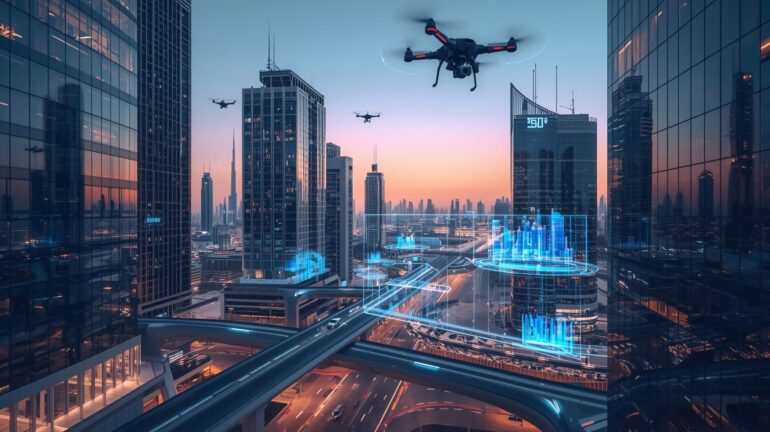
Cities are evolving rapidly, driven by technological innovation and the growing demands of urban populations. As urbanization accelerates, governments worldwide are seeking ways to make cities more efficient, sustainable, and livable. At the heart of this transformation lies Artificial Intelligence (AI). By enabling data-driven decision-making and predictive capabilities, AI is powering the development of smart cities that can adapt to the needs of their residents. In the UAE, where smart city initiatives are central to national strategies, AI is not just a technological upgrade it is the foundation for creating the cities of the future.
A smart city relies on interconnected systems that use sensors, data, and analytics to optimize resources and services. AI acts as the brain behind these systems, analyzing vast amounts of data in real time and turning it into actionable insights. This allows governments and service providers to anticipate problems before they occur, reduce inefficiencies, and deliver services tailored to citizens’ needs. For the UAE, which has set ambitious goals under initiatives like Dubai Smart City and Abu Dhabi Vision 2030, AI is a key enabler of progress.
One of the most visible applications of AI in smart cities is traffic and transportation management. Congestion is a universal urban challenge, but AI-powered traffic systems are offering solutions. Smart sensors and cameras can monitor traffic flow, predict congestion, and dynamically adjust traffic signals to keep vehicles moving. In Dubai, AI is already integrated into transport networks to reduce travel time, improve public transit schedules, and enhance road safety. Autonomous vehicles, which rely heavily on AI, are also being tested in the UAE as part of efforts to build safer, more efficient mobility ecosystems.
AI is equally transformative in the field of energy management and sustainability. Smart grids powered by AI can forecast energy demand, optimize distribution, and reduce waste. AI-driven systems also support renewable energy integration by predicting fluctuations in solar or wind supply and balancing them with demand. In the UAE, where sustainability is a national priority, these innovations are critical for achieving goals such as the UAE Net Zero 2050 strategy. Intelligent energy systems not only reduce carbon emissions but also lower costs, making cities greener and more economically resilient.
Another area where AI is proving essential is public safety and security. AI-powered surveillance systems equipped with facial recognition and predictive analytics can assist law enforcement in identifying risks, detecting unusual patterns, and responding faster to emergencies. While such technologies raise important ethical questions, when deployed responsibly, they can play a vital role in enhancing safety and building citizen trust. In the UAE, AI-driven policing initiatives are being used to prevent crime and streamline emergency responses, demonstrating how technology can safeguard urban communities.
AI is also central to waste and resource management in smart cities. From intelligent waste bins that signal when they need emptying to AI systems that predict consumption patterns of water and electricity, cities are finding new ways to conserve resources. In arid regions like the UAE, where water conservation is critical, AI is being used to monitor usage and detect leaks in real time. These innovations not only improve sustainability but also reduce operational costs for municipalities.
The role of AI extends beyond infrastructure to enhancing citizen experiences. Chatbots powered by AI are being deployed by government agencies to provide 24/7 support for services like visa applications, healthcare inquiries, and bill payments. Virtual assistants can guide residents through complex procedures, reducing wait times and improving accessibility. This citizen-centric approach reflects the UAE’s vision of creating smart cities that are not only technologically advanced but also deeply focused on human well-being.
However, the integration of AI into smart cities is not without challenges. Data privacy and security remain pressing concerns, as vast amounts of personal information are collected and analyzed. Ensuring transparency, ethical use of AI, and robust cybersecurity measures will be essential for building public trust. Interoperability is another challenge, as smart city systems often involve multiple vendors and technologies that must work seamlessly together. Finally, there is the need for digital literacy and inclusion, ensuring that all segments of society can benefit from smart city advancements without creating technological divides.
Despite these challenges, the opportunities far outweigh the risks. The UAE is positioning itself as a global leader in smart city innovation, with AI at the core of its strategy. By integrating AI into transportation, energy, safety, and citizen services, the country is building cities that are not only technologically advanced but also sustainable, secure, and responsive to residents’ needs.
The future of urban living will be defined by intelligence not just human intelligence, but artificial intelligence working in tandem with it. For the UAE, AI is not a distant vision but a present reality shaping smarter cities today. As these initiatives expand, the UAE stands as a model for how AI can create urban environments that are sustainable, efficient, and above all, designed to improve quality of life for every citizen.